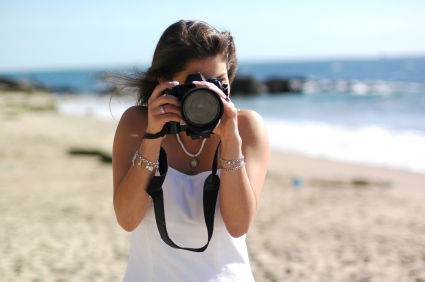With the modern cameras, perhaps taking good photos it may seem easier. Adjustable Zoom, auto focus and an infinite number of properties and functions allow us to take better photos almost anywhere, including the beach, with its white sand, its light reflecting water, and the great general lighting.
However, even with these modern cameras and although we are generally satisfied with the photos we took with this appliance, we can always improve a little more. While not seeking to be professional photographers, we can take this unique photo that we were looking for to complement the decor, to participate in a contest, or just because if, following some good tips.
Details on the beach lighting
Taking pictures at the beach has its tricks, because environmental conditions in general. People, tanned and colored bathing suits, often have sunscreen products on the skin, making it brilliant. This brightness is highlighted when the light of sun, other abundant, is reflected and refracted in the clear sand and water from the sea. In turn, the color of sea and sky color intermingle, hindering the most defined.
These characteristics are typical and traditional beaches. But you do not have a professional camera and go crazy adapting and adjusting the settings and properties before each photo. We can apply some simple tricks to achieve this.
Tips for taking better photos
Since sea sand and water reflect, remember to focus overexposing the image, i.e., focusing before photography in one sector, for example skin, a tent, a building far away or a bag of some tourist, avoiding focus on the sand. Focus on dark spots will delude the photometer, giving more light to the picture and avoiding that comes out too dark.
You can do something similar with the color balance of the photo: adapting the program or doing a white balance of the elements in the photo you want to obtain.
If the sun is high in the sky, causing shadows too strong or highlighted, you can use a flash called “filler”. If your camera does not have this property, just use the flash stronger than having the camera. If you do not have more options than ‘if’, ‘no’ and ‘Automatic’, take it to ‘yes’, although it is not necessary to take the photo with flash and will help to conceal these shadows rigid.
How to protect cameras in the beach
Just as you care for your skin and your health on the beach, applying yourself sunscreens and wearing glasses, remember that the camera is a fragile and delicate item. If your camera is aquatic you won’t have a problem with moisture, but if with the moisture of salt water. If your camera is not waterproof (which is most cases) should always carry a waterproof or absorbent, and clean every night after use on the beach. Avoid leaving the sun, on the sand, or handle it with wet hands, and guard it from shock, scratches and threats of all kinds.


